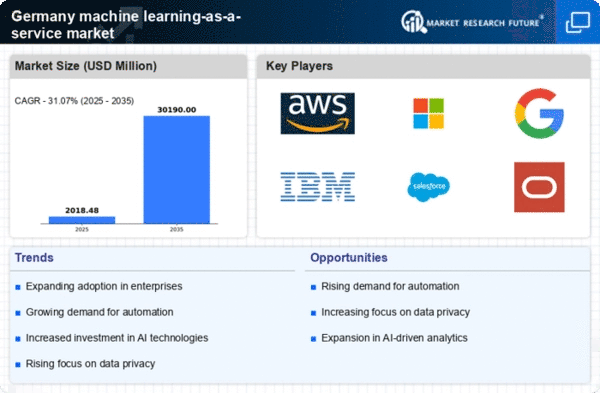Increased Focus on Automation
The machine learning-as-a-service market is witnessing a heightened focus on automation across various industries in Germany. Organizations are increasingly adopting automated solutions to streamline processes, reduce operational costs, and enhance efficiency. This trend is reflected in a survey indicating that over 60% of German companies plan to implement automation technologies within the next two years. Machine learning plays a crucial role in this automation journey, enabling businesses to analyze vast amounts of data and make real-time decisions. As automation becomes a strategic priority, the demand for machine learning-as-a-service solutions is expected to rise, positioning the market for substantial growth.
Rising Demand for Predictive Analytics
The machine learning-as-a-service market in Germany is experiencing a notable surge in demand for predictive analytics. Businesses across various sectors are increasingly recognizing the value of data-driven decision-making. This trend is evidenced by a projected growth rate of approximately 25% annually in the adoption of predictive analytics solutions. Companies are leveraging machine learning to forecast trends, optimize operations, and enhance customer experiences. As organizations seek to gain a competitive edge, the integration of predictive analytics into their strategies becomes paramount. This rising demand is likely to propel the machine learning-as-a-service market forward, as more enterprises invest in these advanced capabilities to harness the power of their data.
Expansion of Data Sources and Availability
The availability of diverse data sources is significantly impacting the machine learning-as-a-service market in Germany. With the proliferation of IoT devices, social media, and other digital platforms, organizations now have access to vast amounts of data. This abundance of data presents both opportunities and challenges for businesses looking to implement machine learning solutions. Companies are increasingly recognizing the need to harness this data effectively to derive actionable insights. As a result, the machine learning-as-a-service market is likely to expand, as organizations seek to leverage advanced analytics capabilities to process and analyze large datasets, ultimately driving innovation and growth.
Growing Interest in Customizable Solutions
The machine learning-as-a-service market in Germany is experiencing a shift towards customizable solutions tailored to specific business needs. Companies are increasingly seeking platforms that allow them to modify algorithms and models according to their unique requirements. This trend is driven by the realization that one-size-fits-all solutions may not effectively address the complexities of diverse industries. As a result, providers of machine learning-as-a-service are adapting their offerings to include more flexible and customizable options. This growing interest in tailored solutions is likely to enhance customer satisfaction and drive further adoption of machine learning technologies across various sectors.
Government Initiatives Supporting AI Development
In Germany, government initiatives aimed at fostering artificial intelligence (AI) development are significantly influencing the machine learning-as-a-service market. The German government has allocated substantial funding, estimated at €3 billion, to support AI research and innovation. This funding is intended to enhance the country's technological infrastructure and promote collaboration between academia and industry. As a result, startups and established companies are increasingly adopting machine learning-as-a-service solutions to align with national priorities. The support from governmental bodies not only boosts investment in AI technologies but also encourages the development of a skilled workforce, further driving the growth of the machine learning-as-a-service market.
















